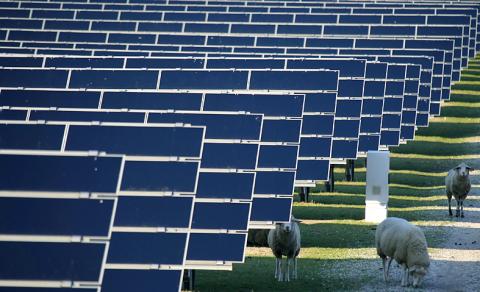Foxconn Technology Group’s (富士康) decision to start making solar power modules may speed the rate at which margins are narrowing for Chinese manufacturers, another blow for an industry already coping with a plunge in prices.
The Taiwanese company that’s the world’s biggest contract maker of electronics, including Apple Inc’s iPhone, started work on a solar-module plant in China’s Jiangsu Province near the headquarters of Suntech Power Holdings Co (尚德), the largest silicon-based module manufacturer.
HUGE SUPPLY

Photo: Reuters
“Foxconn plans to build new factories with undreamed-of scale and lower cost,” Jenny Chase, who leads a team of six solar analysts at Bloomberg New Energy Finance, said on Friday. “It will push capacity higher and prices lower.”
Prices for solar cells have skidded 62 percent this year as Chinese companies led by Suntech boosted production and won market share from European and Japanese rivals. Foxconn’s gross margin of 5.6 was less than half Suntech’s in the third quarter, according to data compiled by Bloomberg.
Chase said Foxconn’s EBITDA margin ranges from 2 percent to 5 percent compared with as much as 30 percent enjoyed by the companies purely manufacturing solar products.
“Foxconn is good at operating with low margins in electronics and can replicate the success it has there to the solar industry,” Lian Rui (廉銳), a senior analyst for the research company Solarbuzz, said by telephone from Shanghai.
It “will make the competition fiercer and drive margins down further,” Lian said.
TRIAL PRODUCTION
Foxconn will begin trial production in May, the Funing County Government, where the plant is located, said in a statement on its Web site on Thursday.
The company’s Hon Hai Precision Industry Co (鴻海精密) unit will invest US$30 million as registered capital to set up Fuyu Energy Technology (Funing) Co (富昱能源科技[阜寧]公司) in the county, according to a filing on Tuesday to the Taiwan Stock Exchange. The unit will make solar cells. No details about the plant’s capacity were given.
Suntech’s gross margin declined to 13.3 percent in the third quarter from 17.9 percent a year earlier. Shanghai-based JA Solar Holdings Co (晶澳太陽能) had a negative 4.3 percent gross margin in the third quarter compared with 22.5 percent last year.
Asian solar companies enjoyed high margins in the industry as shipments surged last year. The average gross margin for the 10 Asia-based solar companies in Bloomberg Industries’ Large Solar Index was 24.6 percent last year. Trina Solar Ltd (天合光能) had a gross margin of 33.2 percent and Yingli Green Energy Holding Co (英利新能源) 31.5 percent, the Bloomberg data shows.
Foxconn’s gross margin was 5.6 percent in the six months through June 30, down from 6.8 percent in the second half of last year, Bloomberg data also shows.
PRICE DROP
The average price for solar modules has declined 47 percent this year to US$0.94 a watt, according to Bloomberg New Energy Finance. Three US companies led by Solyndra LLC filed for bankruptcy this year. In Germany, Q-Cells SE, once the world’s biggest solar maker, is looking for a partner after its earnings and margins plunged.
“Foxconn’s entry into the solar industry has been rumored for a long time,” Chase said. “The company’s formal entry at a time when ingot, wafer and cell makers are not making their cash costs must be bad news for the incumbent companies.”

Nvidia Corp chief executive officer Jensen Huang (黃仁勳) on Monday introduced the company’s latest supercomputer platform, featuring six new chips made by Taiwan Semiconductor Manufacturing Co (TSMC, 台積電), saying that it is now “in full production.” “If Vera Rubin is going to be in time for this year, it must be in production by now, and so, today I can tell you that Vera Rubin is in full production,” Huang said during his keynote speech at CES in Las Vegas. The rollout of six concurrent chips for Vera Rubin — the company’s next-generation artificial intelligence (AI) computing platform — marks a strategic

Enhanced tax credits that have helped reduce the cost of health insurance for the vast majority of US Affordable Care Act enrollees expired on Jan.1, cementing higher health costs for millions of Americans at the start of the new year. Democrats forced a 43-day US government shutdown over the issue. Moderate Republicans called for a solution to save their political aspirations this year. US President Donald Trump floated a way out, only to back off after conservative backlash. In the end, no one’s efforts were enough to save the subsidies before their expiration date. A US House of Representatives vote

REVENUE PERFORMANCE: Cloud and network products, and electronic components saw strong increases, while smart consumer electronics and computing products fell Hon Hai Precision Industry Co (鴻海精密) yesterday posted 26.51 percent quarterly growth in revenue for last quarter to NT$2.6 trillion (US$82.44 billion), the strongest on record for the period and above expectations, but the company forecast a slight revenue dip this quarter due to seasonal factors. On an annual basis, revenue last quarter grew 22.07 percent, the company said. Analysts on average estimated about NT$2.4 trillion increase. Hon Hai, which assembles servers for Nvidia Corp and iPhones for Apple Inc, is expanding its capacity in the US, adding artificial intelligence (AI) server production in Wisconsin and Texas, where it operates established campuses. This

US President Donald Trump on Friday blocked US photonics firm HieFo Corp’s US$3 million acquisition of assets in New Jersey-based aerospace and defense specialist Emcore Corp, citing national security and China-related concerns. In an order released by the White House, Trump said HieFo was “controlled by a citizen of the People’s Republic of China” and that its 2024 acquisition of Emcore’s businesses led the US president to believe that it might “take action that threatens to impair the national security of the United States.” The order did not name the person or detail Trump’s concerns. “The Transaction is hereby prohibited,”